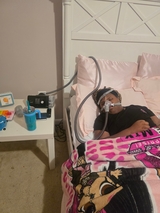Finally Breathing Easy: Ava’s Story
Finally Breathing Easy: Ava’s Story
Twelve-year-old Ava loves makeup. At the end of every week, if she’s worn her CPAP mask each night, she is allowed time to play with her makeup, which she loves putting on herself – and other family members! Getting Ava to regularly wear her CPAP mask, however, wasn’t always so easy. “The CPAP was a struggle,” says Ava’s mom, Monique. One of many struggles Ava and her family have already had to navigate over the last 12 years.
Ava was born with trisomy 21, commonly known as Down syndrome. Children with Down syndrome are at a greater risk for certain medical conditions, including congenital heart disease. Ava was diagnosed with tetralogy of Fallot shortly after birth and underwent a series of three open-heart surgeries – her last in 2019.
In 2023, Ava began to have recurrent episodes of pneumonia in her left lung, sometimes running fevers higher than 103°F. “I was constantly running between the Urgent Care and CHOP’s Emergency Department,” says Monique, who lives with her family of four in Delaware, a 90-minute drive from Children’s Hospital of Philadelphia (CHOP). “I’d had enough.”
One night, Ava’s fever spiked to nearly 105°F. Monique called Ava’s doctor, Alyssa Siegal, MD, attending pediatrician at CHOP. “I said if I brought her in, we were staying,” remembers Monique.
Dr. Siegal quickly consulted with Ambika Shenoy, MD, a pulmonologist in CHOP’s Division of Pulmonology and Sleep Medicine. Ava was admitted to the hospital that night.
The hidden culprit behind Ava’s symptoms

Ava’s treatment included two inhalers and chest therapy, during which percussion cups are used to loosen and move mucus in children with chronic respiratory issues. Despite these time-consuming treatments, Ava needed more testing since the underlying cause of her symptoms remained a mystery.
A CT scan of Ava’s chest showed she had a diaphragmatic hernia – a rare condition in which Ava’s abdominal organs had moved into her chest, crowding her heart and lungs. While surgery would help alleviate some of Ava’s symptoms, the diaphragmatic hernia wasn’t the only cause of her recurrent infections.
Additional testing by CHOP’s Immunology Program showed that Ava also had an antibody deficiency disorder, which means her body wasn’t producing enough antibodies to fight off infections, particularly respiratory infections. She now takes a low dose of antibiotic daily to prevent future infections.
However, Ava now faced a new challenge: her presurgical testing included a sleep study which revealed she also had sleep apnea, a condition where breathing repeatedly stops during sleep.
Finding the right fit

Ava was prescribed a continuous positive airway pressure (CPAP) machine, a device that delivers a continuous stream of pressurized air through a mask that fits over the face. This pressure keeps the airways open, preventing breathing disruptions. However, the 12-year-old found the mask uncomfortable and didn’t like the feeling of air on her face. She would often take it off.
Because she wasn’t breathing properly at night, Ava wasn’t getting enough sleep. Exhausted during the day, she would often fall asleep on the bus and even in the classroom.
The family turned to CHOP’s Sleep Center, a specialized program that diagnoses and treats children with various sleep disorders. The Sleep Center takes an interdisciplinary approach that includes support from both physicians and psychologists.
Ava was seen by Helen Ku, MSN, RN, CPNP-PC, a nurse practitioner with the Sleep Center. Helen recommended a different CPAP mask, which could be removed less easily. In addition, Ava and her mom met with Melissa S. Xanthopoulos, PhD, a Sleep Center psychologist.
Dr. Xanthopoulos worked with the family to help reduce Ava’s resistance to the mask through a behavioral modification technique called “desensitization.” Ava would wear the mask for a few minutes each day, gradually adding time until she was willing to keep the mask on at night. She also earned rewards, such as time with her beloved makeup, whenever she willingly wore the mask.
Now, Ava wears her mask every night and, as a result, sleeps close to nine hours each night and is no longer falling asleep at school. “She has more energy,” says Monique. “It’s really had a positive impact.”
Getting the “zzz” she needs
Ava’s medical journey continues; she is followed by Pulmonary, Immunology, Cardiology and other specialties across CHOP with ongoing support from the Trisomy 21 Program. “Dr. Siegal keeps everything in lock step,” says Monique. “I love her for that.”
Spunky and sometimes stubborn, Ava loves dancing and caring for others when they are feeling down. She enjoys spending time with her family, especially her older brother, Daniel, with whom she shares a special bond.
“You really have to do what works for your child,” says Monique. “You have to be willing to think outside of the box, to keep trying. If it wasn’t for Helen Ku, Dr. Xanthopoulos and our whole care team at CHOP, I don’t know where we’d be.”